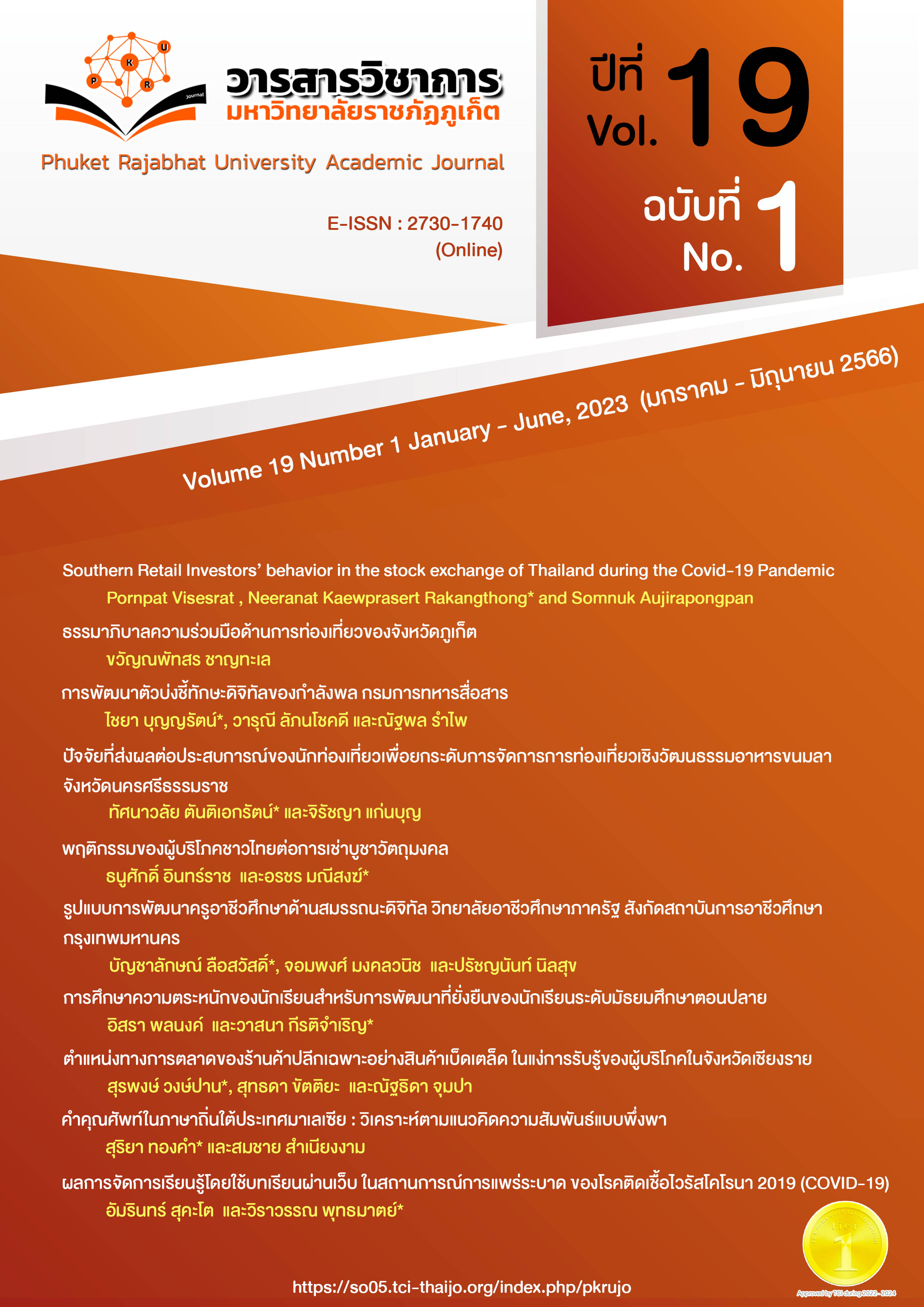การศึกษาความตระหนักของนักเรียนสำหรับการพัฒนาที่ยั่งยืนของนักเรียนระดับมัธยมศึกษาตอนปลาย
Main Article Content
บทคัดย่อ
การวิจัยครั้งนี้มีวัตถุประสงค์เพื่อ 1) ศึกษาความตระหนักถึงการพัฒนาที่ยั่งยืนของนักเรียนระดับมัธยมศึกษาตอนปลาย 2) เปรียบเทียบความตระหนักถึงการพัฒนาที่ยั่งยืนของนักเรียนระดับมัธยมศึกษาตอนปลายที่ศึกษาอยู่ในระดับชั้นที่แตกต่างกัน และ 3) เปรียบเทียบความตระหนักถึงการพัฒนาที่ยั่งยืนของนักเรียนระดับมัธยมศึกษาตอนปลายที่ศึกษาในแผนการเรียนที่แตกต่างกัน โดยใช้วิธีวิจัยเชิงสำรวจ กลุ่มตัวอย่าง คือ นักเรียนระดับมัธยมศึกษาตอนปลาย สังกัดสำนักงานเขตพื้นที่การศึกษามัธยมศึกษานครราชสีมา ในปีการศึกษา 2565 จำนวน 395 คน ซึ่งได้มาด้วยวิธีการสุ่มแบบหลายขั้นตอน เครื่องมือการวิจัย คือ แบบสอบถามความตระหนักถึงการพัฒนาที่ยั่งยืนซึ่งมีค่าความเชื่อมั่นเท่ากับ 0.88 วิเคราะห์ข้อมูลโดยใช้ค่าเฉลี่ย ส่วนเบี่ยงเบนมาตรฐาน ค่าร้อยละ และสถิติการวิเคราะห์ความแปรปรวนทางเดียว ผลการวิจัยพบว่า 1) นักเรียนระดับมัธยมศึกษาตอนปลายมีความตระหนักถึงการพัฒนาที่ยั่งยืนโดยรวมอยู่ในระดับมาก 2) นักเรียนที่ศึกษาในระดับชั้นที่แตกต่างกันมีความตระหนักถึงการพัฒนาที่ยั่งยืนแตกต่างกันอย่างมีนัยสำคัญทางสถิติที่ระดับ .05 และ 3) นักเรียนที่ศึกษาในแผนการเรียนที่แตกต่างกันมีความตระหนักถึงการพัฒนาที่ยั่งยืนแตกต่างกันอย่างมีนัยสำคัญทางสถิติที่ระดับ .05 โดยปัจจัยที่เป็นบริบทใกล้ตัวนักเรียนจะมีผลต่อความตระหนักถึงการพัฒนาที่ยั่งยืนมากที่สุด
Article Details

อนุญาตภายใต้เงื่อนไข Creative Commons Attribution-NonCommercial-NoDerivatives 4.0 International License.
เนื้อหาและข้อมูลในบทความที่ลงตีพิมพ์ในวารสารวิชาการมหาวิทยาลัยราชภัฏภูเก็ต ถือเป็นข้อคิดเห็นและความรับผิดชอบของผู้เขียนบทความโดยตรง ซึ่งกองบรรณาธิการวารสารฯ ไม่จำเป็นต้องเห็นด้วยหรือร่วมรับผิดชอบใด ๆ
บทความ ข้อมูล เนื้อหา รูปภาพ ฯลฯ ที่ได้รับการตีพิมพ์ในวารสารวิชาการมหาวิทยาลัยราชภัฏภูเก็ต ถือเป็นลิขสิทธิ์ของวารสารวิชาการมหาวิทยาลัยราชภัฏภูเก็ต หากบุคคลหรือหน่วยงานใดต้องการนำทั้งหมดหรือส่วนหนึ่งส่วนใดไปเผยแพร่ต่อหรือเพื่อกระทำการใด ๆ จะต้องได้รับอนุญาตเป็นลายลักษณ์อักษรจากวารสารวิชาการมหาวิทยาลัยราชภัฏภูเก็ตก่อนเท่านั้น
เอกสารอ้างอิง
Adam, A. (2020). Sample size determination in survey research. Journal of scientific research & reports, 26(5), 90-97.
Afron, N., & Ilham, Z. (2020). Assessment of knowledge, attitude and practice of university students towards sustainable development goals. The Journal of indonesia sustainable development planning, 1(1), 31-44.
Aminrad, Z., Zakariya, S., Hadi, A.H., & Sakari, M. (2013). Relationship between awareness, knowledge and attitudes towards environmental education among secondary school students in malaysia, World applied sciences journal, 22(9), 1326-1333.
Boonmee, P., Wongsan, S. M., & Kawila, T. (2018). Knowledge, perception, and awareness of
risk management and patient safety towards nursing students at boromarajonani college of nursing, phayao. Journal of nursing and education, 11(3), 112-124
Dourish, P., & Bellotti, V. (1992). Awareness and coordination in shared workspaces. In Computer-supported cooperative work. Proceedings of the 1992 ACM conference (pp. 107-114). Association for Computing Machinery. https://dl.acm.org/doi/10.1145/143457.143468
Hassan, A., Noordin, T. A., & Sulaiman, S. (2010). The Status on the level of environmental awareness in the concept of sustainable development amongst secondary school students. Procedia – social and behavioral science, 2(2), 1276-1280.
Khalil, D., Ramzy, O., & Mostafa, R. (2013). Perception towards sustainable development concept: egyptian students’ perspective. Management and policy journal, 4(3), 307-327.
Laurie, R., Tarumi, Y. N., Mckeown, R., & Hopkins, C. (2016). Contributions of education for sustainable development (esd) to quality education: a synthesis of research. Journal of education for sustainable development, 10(2), 226-242.
National Science and Technology Development Agency. (2019). Green economy. http://www.stopcorruption.moph.go.th/application/editors/userfiles/filesหนังสือ%20เศรษฐกิจสีเขียว.pdf
Ngourungsi, K. (2016). Education for sustainable development (ESD). Journal of the association of researchers, 21(2), 13-18.
Office of the Education Council. (2019). Developing the international education for achieving the sustainable development goals of the world. prigwhan Graphic. http://backoffice.onec.go.th/uploads/Book/1693-file.pdf
Siribanpitak, P. (2010). Education for sustainable development: basis of education about economy, society and environment. Thai Samphan Printing, Ltd.
Sola, A., & Michael, E. (2016). Awareness of climate change and sustainable development among undergraduates from two Selected University in Oyo State, Nigeria. World journal of education, 6(3), 70-77.
United Nations Educational, Scientific and Cultural Organization. (2012). Education for sustainable development. United Nations UNESCO
United Nations Educational, Scientific and Cultural Organization. (2016). Education for People and Planet: Creating Sustainable Futures for All. Paris, France: United Nations Educational, Scientific and Cultural Organization.
United Nations Educational, Scientific and Cultural Organization. (2020). Education for Sustainable Development: A Roadmap. Paris, France: United Nations Educational, Scientific and Cultural Organization.
United Nations. (1987). Report of the world commission on environment and development: our common future. https://www.are.admin.ch/are/en/home/media/publications/sustainable-development/brundtland-report.html
Yuan, X., Yu, L. and Wu, H. (2021). Awareness of sustainable development goals among students from a Chinese senior high school. Education science, 11(9), 458, 1-25. https://doi.org/10.3390/educsci11090458


